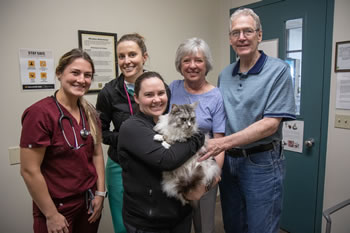
VHC technician Malissa Hoehn holds Nora.
In February 2022, Judy and Tom Williams of Overland Park, Kansas, brought Nora, their 11-year-old Maine Coon, to their local veterinarian for a routine teeth cleaning. During this visit, their veterinarian, Ellen Gloor, DVM, a graduate of the University of Missouri College of Veterinary Medicine, discovered a cyst on the bottom of Nora’s tongue. Without hesitation, Gloor took a sample for biopsy, which revealed squamous cell carcinoma. “We were scared to death,” said Judy Williams.
It was then that the Williamses began looking for consultation and treatment options for Nora. They scheduled an initial appointment with Gregory Vernon, DVM, a radiation oncology resident at the MU Veterinary Health Center. During that meeting, Vernon advised that because of the small and isolated nature of the cancer, he believed it could be treated surgically without the need for chemotherapy, radiation or immunotherapy.
In March 2022, Ashton Story, DVM, a small animal surgery resident, and Megan Mickelson, DVM, DACVS, ACVS surgical oncology fellow, assistant professor of small animal surgical oncology, successfully removed the mass, and days later the biopsy report showed that the margins were clean.
The type of cancer and location of the mass frequently has a less positive outcome, Story said. Tumors in cats are often larger and more advanced at the time of diagnosis, especially when located in the mouth without visible external components. “A squamous cell carcinoma is very locally destructive to surrounding tissues, including bone and often occurs on the face or mouth of cats,” said Story. “With larger tumors, removal often necessitates more aggressive surgery such as a partial removal of the jaw for complete removal of the mass. Even an aggressive surgery may be unable to achieve complete removal and other treatment options like radiation can be considered. In many cases, the mass grows large enough without treatment that it compromises quality of life enough to warrant euthanasia.”

From left: VM4 Jessica Taylor, Ashton Story, Malissa Hoehn, Judy Williams and Tom Williams pose with Nora.
Early identification and diagnosis were key to avoiding the more invasive options, said Story. “Nora was fortunate that her primary veterinarian noted the mass when it was so small, as we were able to perform a less aggressive procedure, removing the mass under the base of her tongue without compromising the tongue,” said Story. “We were also fortunate to have obtained complete excision of the mass. Nora has since been cancer free over a year out from surgery.”
Following the surgery, both clients and doctors were elated with the outcome. “The Saturday that Dr. Story called me, she was giddy,” said Judy Williams. “When it comes to cancer in cats, we know all too often the prognosis is unfavorable. In Nora’s case, because of the MU staff’s exceptional care, the team had a great success.”
The Williamses also credited Malissa Hoehn, RVT, a technician in the oncology service. “Throughout our six-month experience with MU’s Veterinary Health Center, it was surgery oncology technician Malissa Hoehn who made us comfortable with Nora’s procedures, kept us informed, and provided loving care to Nora,” the family wrote in a letter to the VHC team. “Everybody did what needed to be done. The stars lined up for us and we are so blessed that Nora is still with us.”
Now, more than a year since her surgery, Nora remains cancer free. She has made a few trips back to the VHC for a removal of gingival mucosal hyperplasia and for a knee ligament injury that didn’t require surgery. She also has quarterly checkups for the squamous cell carcinoma with Gloor in Kansas City.
“She’s perfect,” said Judy Williams about Nora’s current condition.
By Nick Childress



